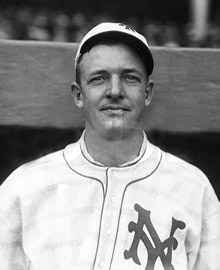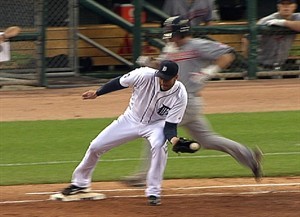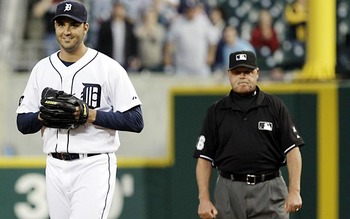I originally opined on the subject of Omar Vizquel and the Hall of Fame about two years ago, and I notice that I have gotten a lot of traffic and comments on that post lately, so I thought I would update it a bit. But feel free to go and read the original post and especially the comments, as some people made some good points with which I was forced to grapple.
Two years ago, Henry Shulman of the San Francisco Chronicle suggested that some writers might be thinking of voting Omar Vizquel into the Hall of Fame, once he's eligible. Shulman said that he conducted "a small straw poll of hall voters" which probably means he asked two guys while they were sitting in the press box together, covering a game. More recently, due to the fact that Vizquel has surpassed 2,700 career hits and continues to add to his record for career games as a shortstop, the subject of whether Omar = Hall of Famer has come up again. Let's examine the case, sort of a sports interaction review, one merit at a time:
1) Lots of Hits
Of course, 2,700 career hits on its own is not such a big deal. Harold Baines has about 150 more hits than Vizquel and the BBWAA writers have shown no particular inclination to enshrine him. Derek Jeter currently has 99 more hits than Omar, and continues to widen that gap, but obviously has a lot more going for him than a lot of singles (and a lot more outs). Roberto Alomar has more, too, and will probably be elected to the hall of Fame this or next year, as will Barry Larkin. The presence of two contemporary middle infielders who combined defensive acumen with offensive prowess will only make it harder for the light-hitting Vizquel to get in.
Andre Dawson just recently got into Cooperstown, but he's got over 400 homers and an MVP award to his credit as well, plus a cool nickname. Vada Pinson and Al Oliver and Bill Buckner and a bunch of other guys all have 2,700 or more hits and have no hope of ever being elected. They all had their merits, but none was considered a sufficiently great player to get real consideration for the Hall.
2) Lots of Games
Being the career leader in games played as a shortstop is a meritorious achievement too, but again, not enough. The other defensive positional leaders (Pudge Rodriguez, Eddie Murray, Eddie Collins, Brooks Robinson, Barry Bonds, Willie Mays, Roberto Clemente) were all great players in other ways than simply their ability to repeatedly answer the bell.
To look at this another way, if the #2 or #3 player at each of these positions had in fact made it to #1, would that make him a Hall of Famer? Carlton Fisk, Joe Morgan, Jake Beckley, Luis Aparicio, Rickey Henderson, Hank Aaron and Tony Gwynn are already in, and Fred McGriff and Roberto Alomar are on the edge, likely to get in eventually.
But the #2 center fielder - another position that requires some defensive prowess - is Steve Finley, and #3 is Willie Davis. The #3 catcher, just one behind Fisk, is Bob Boone, a man known primarily for his defense. Greg Nettles (whom Bill James calls the "Incredible Leaping Octopus") and Gary Gaietti are the next two third basemen, and Luis Gonzales is the next left fielder. Do you really think that any of these guys would be a solid candidate for Cooperstown if they'd played a few more games or if the leader had played fewer?
Neither do I.
3) Lots of Gold Gloves
Another argument in his favor is his cache of 11 Gold Gloves. the number of course is not enough. Keith Hernandez also has 11. Andruw Jones has 10. Mark Belanger, Paul Blair, Don Mattingly, Frank White and George Scott all have at least eight, and none has ever gotten serious consideration for Cooperstown. A great defensive reputation simply is not enough. Rob Neyer argued that the fact that the man was never considered a great player, not just defender, should mean that the writers wouldn't even consider voting for him.
Look, Gold Gloves are more of a popularity contest than anything else. Derek Jeter, who truly is a great player, has four of them, even though he only recently turned himself into an adequate defensive shortstop. Steve Garvey's got four of them, despite the fact that the man never threw the ball to second base. Jason Varitek has one, for crying out loud. At best, perhaps they reflect a player's ability to repeatedly look impressive or acrobatic while making the same plays that look routine when accomplished by better prepared defenders. Adam Everett, let's say.
There's little question that Vizquel has been a very good defender over the course of his career, but much of his defensive reputation rests on his appearance rather than on his results. In 2006, for example, he won a Gold Glove largely on the merits of his league-leading .993 fielding percentage, but the more advanced metrics - Total Zone Runs, Fielding Bible +/-, UZR, FRAA,- all seem to suggest that he was somewhere between the 5th and 10th best defensive shortstop in MLB that year. Granted, there have been years (2007, for one) where he actually was the best, and didn't get the Gold Glove, but the former occurrence is much more common.
The Case Against: Career Value
The truth is that, despite his longevity, Vizquel has never been a great player, and the baseball writers, the ones who vote for the Hall of Fame, know it. He only received any votes for the MVP once, finishing a distant 16th in 1999. He was worth about six Wins Above Replacement that year, a true all star caliber performance, and the only time in his 22-season career that he crested the 4.0 WAR plateau. MVPs are typically about 8 WAR or more in that year and Hall of Famer shortstops, though there is a significant range, average about 64 WAR for their careers, as you will see.
This lack of MVP appreciation has occurred despite the fact that Vizquel frequently anchored the infield defenses of playoff teams with the Tribe in the late nineties and early aughts. For getting into the playoffs, especially playing in a world series, odds should increase of getting MVP votes, but alas, not so much. Also, he's not much of a singer.
Comparison to the Elite:
There are the 23 players whom the Hall considers shortstops, and the following list shows their Baseball Prospectus career WARP3 totals, which is Wins Above Replacement Position, encompassing offense, defense and even pitching, adjusted for all time. Additionally, I have included his WAR, Wins Above Replacement, as calculated by Sean Smith of baseballprojection.com.
This means, by definition, that these numbers allow us to compare players across different eras.
Shortstop WARP3 WAR
Luis Aparicio 47.4 49.8
Luke Appling 70.7 68.9
Dave Bancroft 38.2 46.3
Ernie Banks 62.9 64.3
Lou Boudreau 73.6 55.9
Joe Cronin 69.0 62.6
George Davis 76.5 90.8
Travis Jackson 43.7 43.4
Hughie Jennings 56.8 47.9
Pop Lloyd ??? ????
Rabbit Maranville 39.9 38.0
Pee Wee Reese 63.1 66.4
Cal Ripken 102.4 89.8
Phil Rizzuto 47.5 41.6
Joe Sewell 51.5 48.1
Ozzie Smith 92.0 64.7
Joe Tinker 51.4 49.0
Aarky Vaughan 85.2 75.6
Honus Wagner 140.6 134.7
Bobby Wallace 60.5 60.4
Monte Ward* 58.9 64.5
Willie Wells ??? ????
Robin Yount 66.8 76.8
Average 66.6 63.8
Omar Vizquel currently sports a total of 41.0 WARP and his WAR is 42.8.
Since the first time I looked at these numbers, Baseball Prospectus has significantly changed its WARP3 formula. The average last time was about 111, almost double what we have now, though the scale is roughly the same.
Also, since I've added WAR to the evaluation, we can see that the two do not always agree. On average, WARP3 and WAR agree to within less than 3, but there are a few significant differences. These generally seem to be in the upper echelon of players though - Ripken, Wagner, Smith, Vaughan, Boudreau and Davis - so it's really only a question of how MUCH better than everyone else those guys really are.It should be noted that some of these guys spent significant amounts of their careers at other positions, and it's therefore perhaps not fair to compare Vizquel to them directly. Ernie Banks actually played more games at first base than he did at short. Yount played almost half his career as an outfielder. Vizquel deserves credit for staying at shortstop, something few 40-year olds ever do, much less do well.
Boudreau and Cronin were, in addition to being very good players, managers for a long time, with some degree of success, and their selections to the Hall may have benefited from this legacy. In truth, though, both had top-10 MVP finishes half a dozen times or so, and probably didn't need any help from their managerial credentials.
Wells and Lloyd were both presumably very good players in the Negro Leagues, but we don't really have any credible numbers for them. Monte Ward was also a pitcher, amassing about 1/3 of his WAR value as such, and was a pioneer in the early days of major league baseball, so he gets some extra credit too. Joe Tinker was elected by a suddenly generous Veterans Committee in 1946, right after a World War, when they were feeling especially nostalgic, apparently. But even if you throw all of those guys out, the average for the remaining players stays almost exactly the same, 67.7 WARP3, hardly any difference at all. So don't worry about that.
With the current formula for either of these statistics, Vizquel is near the
bottom of the list, in the neighborhood of a couple of questionable Hall of Fame choices in Travis Jackson and Dave Bancroft, as well as Rabbit Maranville, who only squeaked into the Hall in his 15th year of eligibility - right after his death - after a big nostalgia vote jump.
In any case,
Maranville's kind of a special case, something of a
baseball whip, a defensive whiz at the toughest defensive position at a time when runs were scarce, so his value, or at least his
perceived value, doesn't show up directly in the numbers as much as it does the MVP voting of the time.
But Omar is well below Rizutto, Pee Wee Reese, Aarky Vaughan, Lou Boudreau or Luke Appling, all five of whom lost time to the War and yet still come out ahead of Vizquel in WAR and WARP.
You can argue that he's no worse or less valuable than some of the gentlemen already in the Hall. It seems obvious that Omar has
done more in his career than some of those guys, given his longevity, despite never being great in a single season. But it's also debatable whether guys like Travis Jackson belong in the Hall in the first place, so that's not a terribly convincing argument.
If you want to use the benchmark of where the
average is, it would seem that Vizquel would significantly drag down the median level of MLB HoF shortstops. By contrast,
Bill Dahlen (77.9 WARP3, 75.9 WAR) would considerably raise that bar, and I don't see anyone clamoring for his candidacy.
This type of argument is something of a slippery slope. It's not a bad starting point to only enshrine players would maintain or even
raise the standard of the existing crop at a given position, but that's not enough, in my mind. We ought to want to make the Hall
more exclusive, and therefore more impressive, not less.
Did He Do Enough?Omar Vizquel was never a great hitter, and rarely even a good one. In 22 seasons in the major leagues, he has only twice had an adjusted OPS above the league average. One of those, 1999, when he had an OPS of 110, was essentially a fluke. He hit
.354(!) when he put the ball in play that year, even though his career mark is .294 and the league average BAbip that year was .302, about what it usually is.
The other time was 2003. His OPS that year was just 104, but that's the only other time it's ever been above 100, and this one looks legit, as his .284 BAbip is actually a little lower than the league. So congrats, Omar, you earned your career-high 14 homers and 72 RBIs that year, even though the rest of your career marks are pretty pedestrian.
Speaking of walking (
see what I did there?), Omar Never took free passes all that often, something that might have helped to bolster his general mediocrity with the bat. He did walk 87 times in Y2K, but only walked more than 60 times twice in his career besides that, and rarely posted an OBP much more than .350 or .360. And that was perhaps the
best part of his offensive game.
He had only one season in which he hit double digit homers. At his peak, he cracked the 30-double mark four times in seven seasons, but never hit more than 36 in a season. he hit a few triples, as he was reasonably fleet of foot in his prime, but for all their excitement, they're of limited value. His supporters may point to the fact that he has stolen almost 400 bases in his career, and that at his best, he twice nabbed more than 40 in a season.
I would point out that he's also been caught 158 times, which ranks as the 21st most in history. For comparison, Juan Pierre has been caught stealing 159 times, but has about 90 more successes. Kenny Lofton was gunned down 160 times, but succeeded 622 times. In an era in which power is increasingly common place, the value of individual bases is severely diminished, while that of baserunners is increased, so Vizquel may have harmed his teams more with those 158 failed attempts than he helped them with the 389 successful ones.
Sure, we
can put Omar Vizquel in. He's better than Dave Bancroft, and almost as good as Travis Jackson, right, even though he doesn't have as cool a first name? But then we've got to let Ron Santo in too, since he's better than George Kell, right? And
what about Harold Baines, since he has the most games and hits and what-not as a Designated Hitter? Shouldn't he be considered Hall-worthy, given that he was apparently so good at what he did?
If you think instead about where the bar
should be, instead of where it is, I think you have to leave Vizquel out of the Hall. Not everyone in the Hall has to be Honus Wagner or Cal Ripken, but "appreciably better than Gary Gaetti (38.4 WARP3)" doesn't seem like such an outlandish requirement to me.
We've had more than 125 years to see what great players look like, and to paraphrase Supreme Court
Justice Potter Stewart, I think we should know them when we see them.
Omar Vizquel is not one of them.














